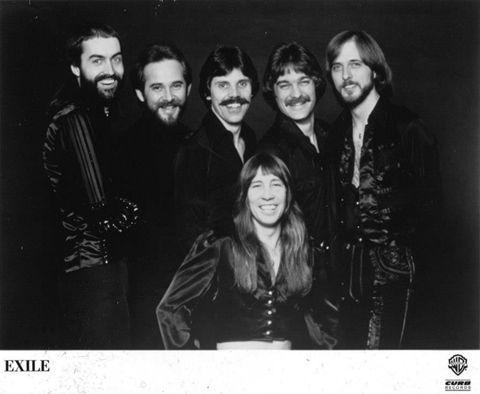Photo Courtesy of Exile
In 1978, the Gibb brothers and younger sibling Andy engaged in a six-month-long ping-pong-like domination over the Billboard Hot 100, volleying one iconic hit to fans after the next. Regardless, this didn’t stop one seemingly-newcomer band from making themselves heard above disco’s collective roar.
Fifteen years into their career, a Kentucky-based sextet named Exile (finally!) reached the pinnacle of success that year with their smoldering track “Kiss You All Over,” a future staple of budding romances and varied soundtracks (remember Adam Sandler plaintively crooning the tune through an intercom in “Happy Gilmore”?). Forty years ago, Exile would be one of only two fresh bands to score a Number One hit; the other being Player of “Baby Come Back” fame.
For Exile, its four weeks at the top helped the group endure into what is now a 55-year career in the spotlight, despite never scoring another pop hit stateside. As keyboardist Marlon Hargis told me during a recent interview: “Our longevity has a lot to do with that song.”
Yet when you listen to “Kiss You All Over” (or “KYOA” as the group calls it) you can hear how it represents a vastly different sound and style versus the group’s more countrified or R&B infused song catalogue. This past summer I snagged Exile’s Greatest Hits at a Cape Cod flea market and marveled at the straightforwardness and ease of songs like “Give Me One More Chance,” “Woke Up in Love,” and “She’s a Miracle.” “Super Love” sounds like an early prototype for the Fabulous Thunderbirds’ “Tuff Enuff.”
Perhaps unsurprisingly, “KYOA” was the last song on the album, as if to intentionally give listeners a chance to enjoy the group’s other musical efforts beforehand.
“Kiss You All Over” was written by noted producer Mike Chapman, who along with partner Nicky Chinn, brought several overseas bands into the limelight – Sweet and Smokie included. As the band prepared to record its breakthrough album Mixed Emotions, “KYOA” entered the picture, but not with any great fanfare by the band, according to Hargis.
“Thinking back, I don’t remember us being blown away by the song. Mike’s writing was a little different than the band’s sound. He had a very pop style of writing and we were basically an R&B band,” he told me. “I didn’t personally think of it as a single, just another song on the album.”
“We started playing the song in clubs because it was a few months before the album came out. We were getting no reaction to that song,” he adds. “When Mike said we had a deal to record it, we were like, ‘Hell, I don’t know if it’s a good idea or not.’ We were totally surprised that the song hit as quickly and as big as it did – to be honest about it.”
Before I get into the essence of the band’s reversed fortunes post-hit single, I’ll recap their journey up until this point. Forming as the Exiles in 1963, the group made its first recording a year later. This led to their joining the “Dick Clark Caravan of Stars,” backing acts like Freddy Cannon (“Palisades Park”), Brian Hyland (the “Itsy Bitsy Teenie Weenie Yellow Polka-Dot Bikini” guy) and B.J. “Hooked on a Feeling” Thomas. From here, there’s a move to New York; a deal with Columbia; a shortening of the band’s name; a jump to Wooden Nickel/RCA; gigging at LA clubs; and the perpetual sending out of musical darts in the form of tapes to labels and industry personnel.
Exile hits the bull’s-eye when a tape lands in Chapman’s hands. After seeing the group perform in Kentucky, Chapman signs them to a production deal. While success isn’t guaranteed, it’s certainly enhanced through Chapman’s influence, as well as the addition of new band members, including Hargis.

“We were basically surviving. The band had decided that we were going to do original material ourselves and maybe one or two covers per album. Because of that it was hard to find work,” Hargis said. “In late ’77, we went into the studio to record Mixed Emotions. At that point, everything broke loose.”
Mixed Emotions, released by Warner Bros., would eventually go gold.
“Literally in a week, everything changed,” Hargis told me. “One Friday night we played in Lexington for the door money and the next Friday we flew to Los Angeles to do The Midnight Special and be on an Aerosmith tour. We tried for years to get to that point.”
“In looking back, everything happened so quickly. For the first year, you didn’t have time to take it in and enjoy it,” Hargis adds. “I think we handled it fairly well at that point. Apart from seeming like being in a daze all the time, it was all good.”
Yet with notoriety surrounding “KYOA” came an unexpected deterrent – Exile being pegged as a disco band, despite the group never setting out to establish itself within that specific genre.
“It sort of put us in a position of being considered a disco act in a way and that was kind of a negative, even though it certainly didn’t hurt record sales,” Hargis told me. “I don’t think of “Kiss” as a disco song. It was a dance track. I always thought that song reminded me of the Lou Reed song “Walk on the Wild Side.” It’s the same chord progression and same sound. I thought of it as an album cut. It was kind of a surprise, I guess, but at the time we weren’t complaining.”
Though the group would see more money resulting from their sudden hitmaker status and would enthrall audiences worldwide at the turn of the decade, another shift in musical direction ultimately proved necessary by the 1980s. This time it was country music. Hargis points out that despite some initial reservations, the shift was largely organic, given many country acts were finding fame covering Exile tracks, including powerhouse quartet Alabama (“The Closer You Get,” “Take Me Down”).
“I thought it was a bad idea because I was not a big country fan but we decided as a business venture it made sense. The country music scene was changing and going more pop with acts like Alabama and the Oak Ridge Boys,” he told me. “It was a specific move but it was also organic. It actually worked out better than we thought.”
Even with this new direction, Exile and Chapman still made magic together, regardless of whether chart successes occurred or not. In 1981, the group would release Chapman and Chinn’s “Heart and Soul,” which despite being their most rocking and impressive song in years only peaked at Number 102 on the Bubbling Under Hot 100 Singles chart. Two years later, a sextet dubbed Huey Lewis and the News took their virtually identical version of the tune all the way to number eight on the Hot 100.
Yet the group’s influence remains strong to this day, permeating everything from Netflix shows to the Grand Ole Opry. Impressive, given that there aren’t many American groups (if any at all) who have survived for close to six decades based essentially on the merits of one song? I need to check the record books on that one.
But unlike other acts who lament achieving fame based off a single tune, Hargis laughingly tells me that’s not the case with Exile: “That would be fairly stupid – that’s what made our career!”
***
Share your feedback and suggestions for future columns with Ira at vinylconfessions84@gmail.com.




















